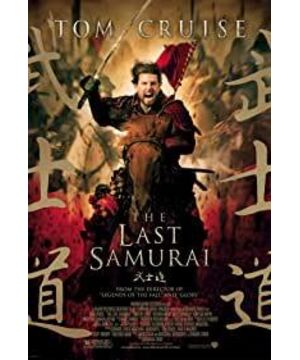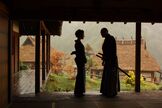Brother Atang: "Let me tell you how he lived!"
Such a meaningful dialogue appeared at the end of the film, and the audience should understand it-Shengyuan is dead. , And the samurai spirit is immortal.
Needless to say, the film is excellent in production and acting. The end of an era deserves filmmakers to reproduce its historical core in awe, admiration, and sorrow, and to pursue perfection in all aspects, especially the core is related to the spiritual level of a nation and a country. After watching, the poignant, tragic feeling tightly entangled the hearts of the audience.
At the end of the 19th century, the Meiji Restoration in Japan, coupled with the impact of Western civilization, made the end of the samurai era a fate. Strong ships and sharp guns will inevitably replace swords, sticks, swords and halberds. The film has chosen such a process, artistic and profoundly reproduce the pain, struggle, inheritance and abandonment in the replacement of the old and the new.
One of the images with strong visual impact is: the samurai astride their war horses, holding long swords, and rushing to the dense bullets and artillery fire one after another-they are collectively sending to death. In the desperate renunciation of life, a spirit clearly survives. You can even feel it permeating and rising in the smoke of gunpowder, shouting in the screams of people and horses...
What is the samurai spirit? The film gives a comprehensive and vivid interpretation. Let’s take only one example and look at a small aspect of the samurai spirit—Atango killed Duoxiang’s husband, and Duoxiang said, “He did his duty, and you did your duty. "She can even fall in love with Brother Tom, and her children will cry because of fear of losing Brother Tom. This is unimaginable in the Chinese concept. The samurai is dead, as long as he acts brave and fearless, then the glory and dignity will belong to him. From their personal commitment, you can see the commitment of the nation; their personal "I", so similar, representing each other, has a broad connotation, and those small, personal grievances can be completely thrown away. From this I think of the spiritual level of the Chinese. In addition to the literati and wise men of the ancient times, they also talked about the strength of character. The "small" of the general public-small peasant economy, small peasant consciousness, petty civic spirit, and standardism make it difficult for every "I" Aggregation, the doughiness and loose sand of the nation, are so bad and obvious.
From "The Last Samurai", we see-not the last, not the end of perdition.
If the spirit is immortal, the nation must be strong and prosperous. The same goes for the country.
http://blog.sina.com.cn/s/blog_717fa25b0101e2i9.html
View more about The Last Samurai reviews











